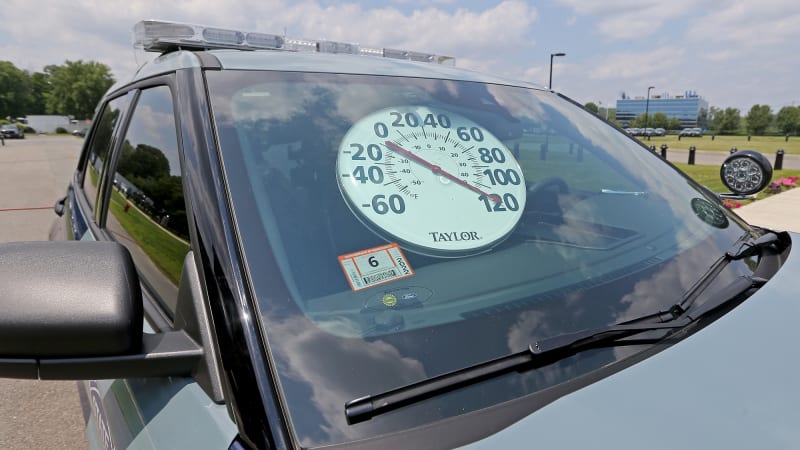You see a pet trapped in a hot car: What are you allowed to do?

Massachusetts State Police conducted a demonstration in 2021 to show how quickly temperatures soar inside a sealed vehicle. On an 80-degree day, this thermometer reading shot to 120 degrees in just 9 minutes. (Boston Herald/Getty Images)
Warm weather is here again, and by now the dangers of leaving a child or a pet in a hot car are — or should be — common knowledge. Obviously children should never be left unattended, and many states have seen the need to specifically outlaw this practice with pets.
Remember, even on a mild 70-degree day, temperatures inside a sealed car can reach 115 degrees, according to the National Highway Traffic Safety Administration, particularly if the car is a dark color. And cracking the windows has been proven not to make enough of a difference.
The National Safety Council says 33 children died from heat stroke in cars in 2022 — and two have died so far this year. And the American Veterinary Medical Association says that hundreds of pets die each year in hot cars. in warm weather, leave your pets at home.
Of course, some newer EV models like Tesla and Rivian have a Pet Mode that keeps climate controls on and pets cool while parked. Here’s an explanation of how Tesla’s feature works. Ford is working to patent a similar function. Some newer cars, such as certain models from Hyundai, Subaru, and Nissan, have a rear occupant alert that will sound audible alarms if it detects movement inside after the driver locks the car. This was originally designed to protect children, but it could apply to pets as well. But most cars on the road don’t have these failsafes.
Thirty-one states have some kind of law meant to protect animals in vehicles. In at least 19 states (plus Washington D.C.), there are laws specifying it’s illegal to leave a pet unattended in a vehicle in extreme temperatures or other life-threatening conditions, and violators can be charged with animal cruelty. Those states are:
Arizona
California
Delaware
Illinois
Maine
Maryland
Massachusetts
Minnesota
Nevada
New Hampshire
New Jersey
New York
North Carolina
North Dakota
Rhode Island
South Dakota
Vermont
Washington
West Virginia
In 21 states (plus D.C.), authorities such as police, firefighters or animal control are allowed to forcibly open a car in order to rescue an animal. This typically involves breaking a window.
Additionally, many states have Good Samaritan laws that shield passers-by from liability when helping someone in distress. In the following 13 states, those laws include rescuing a pet from a hot car:
Arizona
California
Colorado
Connecticut
Florida
Kansas
Louisiana
Massachusetts
Ohio
Oregon
Tennessee
Vermont
Wisconsin
Indiana has a similar law — but requires the Good Samaritan to pay for half of the damages incurred to the vehicle.
If you encounter a pet in distress inside a vehicle …
Keep in mind that:
It’s required that you notify the authorities first before attempting the rescue yourself.
In many cases the laws are written in language that says the rescuer must have a “reasonable belief” the animal is in imminent danger, so there’s some subjectivity there. It might be wise to take a quick video of the situation with your phone in case you need to explain your actions.
Some laws say a rescuer should use no more force or do no more damage than is necessary.
And some states have different considerations for what kinds of animals can be rescued. Some cover only dogs and cats, while others refer to animals more broadly. Other states exclude livestock.
For a full list of what’s allowed in all 50 states, and what your state’s laws say, see this list from Michigan State University’s Animal Legal & Historical Center. Ironically, many of the states that have no laws addressing this issue are in the hot South and Midwest, though those states likely have general animal cruelty statutes.
Finally, the two major groups of automakers serving the U.S. market have agreed to make rear occupant alerts standard on new cars by 2025. The Alliance of Automobile Manufacturers includes the BMW Group, FCA US LLC, Ford Motor Company, General Motors, Jaguar Land Rover, Mazda, Mercedes-Benz USA, Mitsubishi Motors, Porsche, Toyota, Volkswagen Group of America and Volvo. The Association of Global Automakers includes Aston Martin, Bosch, Byton, Denso, Ferrari, Honda, Hyundai, Kia, Isuzu, Local Motors, Maserati, McLaren, Nissan, PSA North America, Subaru, Suzuki, and Toyota.



